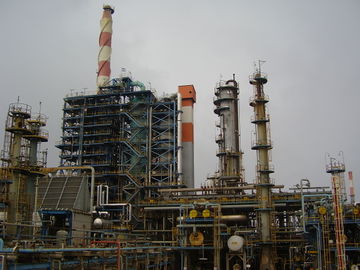Oil refinery

An oil refinery is an industrial plant where crude oil is separated into a variety of different, useful substances through a variety of chemical separation steps.[2] After extraction from the ground, processing at oil refineries is the second step in the production of different petroleum products.[3] This second step in the production of petroleum products is considered to be a portion of the midstream oil and gas industry. Different petroleum products that are obtained at an oil refinery include products such as diesel, gasoline, and heating oils.
In Canada, there are currently 12 companies that run refineries. Most of these companies generally run a single refinery and sell product locally, but a handful of companies own more than one refinery and distribute product worldwide. Of the 19 total refineries in Canada, 16 are able to extract a full range of petroleum products, while others produce a limited number of products. Some of these limited products include asphalt plants and petrochemical plants.[4] In these various oil refineries, a number of processes occur in specialized equipment to produce desired fractions of crude oil. These steps are outlined below.
Refining Steps
Since crude oil is a mixture of a large number of hydrocarbons that each have their own specialized, individual uses, it must be separated into these individual components. The process of oil refining separates this thick, crude oil into different useful substances in an oil refinery through a number of steps:[2]
- Fractional Distillation: Crude oil enters the refinery through a series of pumps and first stops at a heater. In this heater, the crude oil is heated to around 370°C.[5] After the crude oil has been heated and is vaporized, it travels to a distillation tower. Inside these towers the vaporized crude oil is separated into fractions by utilizing their different boiling points. As the vaporized crude oil travels up the tower, fractions with different boiling points condense at different levels, separating different components of the oil. Lighter fractions like butane and propane are collected at the top with heavier fractions collected at the bottom.
- Chemical Processing: Some newer refining processes use chemical process on some fractions to create different fractions in a process called conversion. These processes can break long hydrocarbon chains into shorter ones. In a vessel known as a hydrocracker, heavier petroleum fractions are exposed to heat and pressure in the presence of a catalyst to break up long hydrocarbon chains.[5] This is useful as it converts some of the heavier fractions into more useful fractions, such as gasoline, jet fuel, and propane.
- Treating: The separated fractions from the fractional distillation process are treated and cleaned to remove contaminants such as sulfur. The process of removing sulfur from petroleum products is known as de-sulfurization.[5] This allows the fuels to burn more cleanly and efficiently.
- Blending: After separated fractions have been cleaned, they can be mixed together in special proportions to make desired products. For example, mixing of different products can create gasolines with different octane ratings.
- Storage: Finally, mixed products are stored on-site until they are delivered to distribution areas. As well as making these petroleum products, refineries also treat the waste created in the processes of extracting the different products to minimize air and water pollution.
What's In a Barrel of Oil?
In refineries, unprocessed crude oil is separated into a variety of different useful products. Although crude oil is not useful by itself, when separated a large number of useful hydrocarbons are obtained, primarily gasoline, diesel fuel, heating oil, jet fuel, kerosene, and propane. In addition to this, crude oil yields other important products such as natural gas liquids, petrochemical feedstocks, petroleum coke, heavy fuel oil, asphalt, lubricating oils, naphthas, and waxes. Because all of these useful products are obtained through the refining process, the refining of oil is an incredibly important step in the oil and gas industry. For more information on the exact products that can be obtained from a barrel of crude oil, click here.
Pollution
The refining process releases a number of different pollutants into the atmosphere including sulphur dioxide, nitrogen oxides, volatile organic compounds, particulate matter, carbon monoxide, and benzene in addition to a number of greenhouse gases.[6] In a refinery, the major sources for air pollution are in the catalytic or thermal cracking steps, at the catalytic reformer, at the desulphurization step, and from storage vessels.[7]
Many of the pollutants listed above are harmful to humans and can cause permanent damage. Damage can include respiratory problems - such as asthma, coughing, chest pain, and bronchitis - as well as skin and eye irritations, headaches, and cancers. For more information on the specific side effects of exposure to the pollutants listed above, click through to their respective pages.
References
- ↑ Wikimedia Commons. (September 17, 2015). Haifa Oil Refinery [Online]. Available: https://upload.wikimedia.org/wikipedia/commons/c/c6/PikiWiki_Israel_5905_haifa_oil_refinery.jpg
- ↑ 2.0 2.1 Craig Freudenrich. (November 3, 2015). Oil Refining [Online]. Available: http://science.howstuffworks.com/environmental/energy/oil-refining5.htm
- ↑ EIA "What is the difference between crude oil, petroleum products and petroleum?' online: https://www.eia.gov/tools/faqs/faq.php?id=40&t=6 Accessed August 17th, 2017.
- ↑ Natural Resources Canada. (November 3, 2015). Canadian Refineries [Online]. Available: http://www.nrcan.gc.ca/energy/infrastructure/5895
- ↑ 5.0 5.1 5.2 Irving Oil. (November 2, 2015). Refinery Tour [Online]. Available: http://irvingoil.com/operations_and_partners/refinery_tour/
- ↑ Environment and Climate Change Canada. (January 7, 2016). Petroleum Refining [Online]. Available: https://www.ec.gc.ca/energie-energy/default.asp?lang=En&n=1467336C-1
- ↑ McIlvaine. (January 7, 2016). Refinery Process Air Emissions [Online]. Available: https://www.mcilvainecompany.com/brochures/refinery_process.htm

